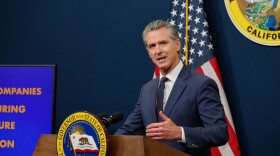ROBERT SIEGEL, host:
From NPR News, this is ALL THINGS CONSIDERED. I'm Robert Siegel.
MELISSA BLOCK, host:
And I'm Melissa Block.
The Middle East peace process has formally resumed. Israeli and Palestinian leaders met at the White House today, one day after pledging to resolve their conflict by the end of the Bush administration. President Bush has made a public personal investment in this new effort. And a former NATO commander has been assigned to help Israelis and Palestinians sort out some of their security issues.
We'll talk with two observers about the prospect for these talks in a few minutes. First, we have a report on the meeting from NPR's Michele Kelemen.
MICHELE KELEMEN: Today's talks were meant to be, as the spokeswoman suggested, a sort of after party, that is after the one-day conference in Annapolis, Maryland. Israeli prime minister, Ehud Olmert and Palestinian Authority president, Mahmoud Abbas, flanked President Bush today in the Rose Garden to hear a few parting words.
President GEORGE W. BUSH: No matter how important yesterday was it's not nearly is important as tomorrow and the days beyond. I appreciate the commitment of these leaders to working hard to achieve peace. I wouldn't be standing here if I didn't believe that peace was possible. And they wouldn't be here either if they didn't think peace was possible.
KELEMEN: Though the two came no closer to agreeing on any of the core issues separating them, they did agree to a statement in Annapolis setting out a goal of reaching a deal by the end of 2008.
White House spokeswoman Dana Perino said President Bush used his private meetings with the men today to offer some words of advice.
Ms. DANA PERINO (White House Press Secretary): And what the president encouraged them to do was to work with their negotiators that there would be days when it looks like things were really tough. But they - if you keep your eye on the big picture that you can help make sure that you have a successful negotiation.
KELEMEN: This is the first time in seven years that President Bush has shown this much interest in the Israeli-Palestinian issue. Though it's clear Secretary of State Condoleezza Rice will be the one doing much of the diplomatic work. She came up with the idea to have a special envoy for Middle East security. Rice said today she's putting former NATO commander James Jones in that role.
Secretary CONDOLEEZZA RICE (U.S. Department of State): Any lasting peace must be built on solid foundations of security. Israelis must be confident that a Palestinian state will increase their security, not detract from it. Palestinians must be capable of standing on their own and policing their territory. And the countries in the region must be invested in the success of the state-building effort for their own security depends on it too.
KELEMEN: Rice intends to keep Lieutenant General Keith Dayton on the job helping build up Palestinian security forces. Officials say Jones' job would be broader, working not only with the Palestinians, but also with the Israelis and other countries in the region. Rice described Jones as a seasoned diplomat and a brilliant strategist who dealt with Israel when he headed the U.S. European command. Jones had only brief comments about his job ahead.
General JAMES JONES (Former NATO Commander): I'm looking forward to getting back to a part of the world that I spent some part of my like 17 years in uniform since 1990. Getting to know - it is critically important. It's great to see the - our country play such an important leadership role.
KELEMEN: Secretary Rice has said little about how she plans to follow up on the peace process and how the U.S. will monitor and judge whether the Israelis and Palestinians are keeping their promises to take confidence building steps. U.S. officials seemed to be still working out General Jones' precise job description as well, much as they ran up against the clock in planning in the Annapolis meeting. Some delegates there privately complained that they were kept in the dark about basic logistics right up until they arrived.
Michele Kelemen, NPR News, Washington. Transcript provided by NPR, Copyright NPR.






